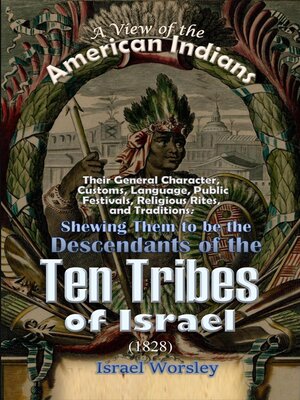A View of the American Indians
ebook ∣ Their General Character, Customs, Language, Public Festivals, Religious Rites, and Traditions: Shewing Them to be the Descendants of the Ten Tribes of Israel (1828)
By Israel Worsley

Sign up to save your library
With an OverDrive account, you can save your favorite libraries for at-a-glance information about availability. Find out more about OverDrive accounts.
Find this title in Libby, the library reading app by OverDrive.



Search for a digital library with this title
Title found at these libraries:
| Library Name | Distance |
|---|---|
| Loading... |
"Are the Ten Tribes of Israel lost or missing?... Jews may have found their way to America." - The Eclectic Review (1829)
"Israel Worsley worked over the material gathered by Boudinot and Smith, and added something." -Narrative and Critical History of America (1889)
"Established some very curious coincidences between the Beni-Israel, and some of the American tribes." -The Congregational Magazine, 1828
Are the Lost Ten Tribes of Israel to be found in Native American tribes of North and South America?
In 1828, Unitarian minister Israel Worsley sought to answer this question in the affirmative by publishing the book:
"A View of the American Indians...Shewing Them to be the Descendants of the Ten Tribes of Israel."
The purpose of Worsley's 1828 book was to give a concise but conspicuous view of the Lost Ten Tribes of Israel, extracting from the works of Ethan Smith, Elias Boudinot, and other sources including incidental remarks of historians, Josephus, Prideaux, Gibbon, Robertson and others, such materials as bear directly upon the point in question.
Among the proofs cited by Worsley in support of Native Americans being descendants of the lost tribes of Israel are the following:
In his concluding chapter, Worsley notes that "in the book of Esdras their journey can be traced into a land where no man dwelt."
About the author: Israel Worsley (1768−1836) was an English Unitarian minister.







